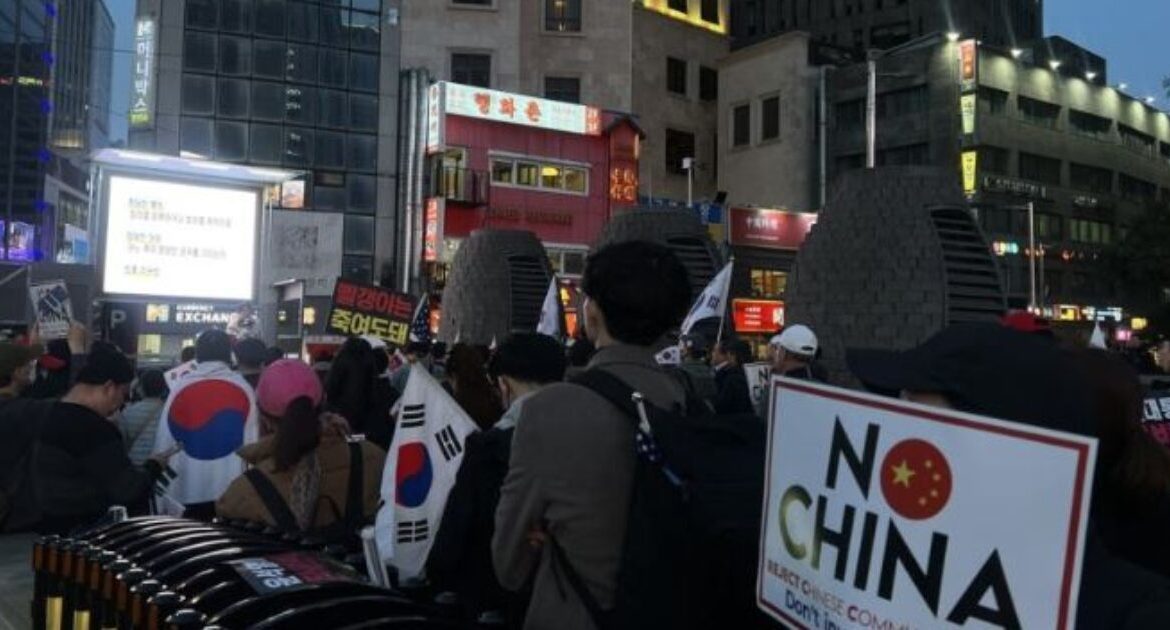
Crackdown on Individual Freedoms Continues in South Korea Under Communist Chinese Pressure


Our contact in South Korea sent The Gateway Pundit an update on the suppression of speech and loss of individual rights under the current pro-Chinese regime.
It is hard to believe that South Korea, a country that fought a bloody war against the communists 70 years ago, is now sliding under communist control.
The alarming suppression of freedom of expression currently taking place in South Korea:
In recent months, conservative civic groups and organizations supporting former President Yoon Suk-yeol have been systematically targeted by investigations. What makes this situation particularly serious is that these crackdowns are happening under clear pressure from China, with the current administration’s cooperation.
Key Cases
1. Banners Against Messenger/SNS Censorship (Prosecuted under Election Law)
A civic group hung banners calling for the protection of students’ freedom of expression. Just before the election, police raided the home and office of the group’s leader, claiming this violated the Public Official Election Act.
However, the banners simply said “No censorship” and did not name or support any candidate or party. This represents a dangerous misuse of election law to criminalize basic social criticism.
2. Welcome Event for U.S. Ambassador Mors H. Tan (July 18, 2025)
Citizens gathered at Incheon Airport to welcome U.S. human rights lawyer and former Ambassador-at-Large Mors H. Tan. Police classified this voluntary gathering as an “illegal assembly” and placed about 600 people under investigation.
Such treatment is in sharp contrast to how fan gatherings for celebrities or athletes at airports are tolerated without issue.
3. Protest in Front of the Chinese Embassy (Reported Aug 19, 2025)
During a rally condemning election fraud, members of a student group supporting former President Yoon tore a banner depicting Xi Jinping and the Chinese Ambassador. Police charged them under “insulting foreign envoys,” a criminal offense.
This shows how political protest is being suppressed through criminal prosecution.
4. China’s Direct Interference and Korean Government’s Compliance
Former Chinese Ambassador Xing Haiming openly demanded that the Korean government “crack down on anti-China forces.”
Chinese state media Global Times warned South Korea against cooperating with the U.S. in shipbuilding, even suggesting that Korea “could face risks” if integrated into the U.S. defense system.
President Lee Jae-myung himself stated at a cabinet meeting:
> “얼마 전에 보니까 중국 외교공관 앞에서 표현의 자유를 넘어서는 욕설과 폭력이 난무하는 혐오 시위가 벌어졌다. 다양성과 포용성을 중시하는 민주주의 모범 국가라는 대한민국의 위상에 결코 걸맞지 않은 모습이다. 재발하지 않도록 필요한 조치를 철저히 취하라. 필요하다면 제도적 보완책도 마련해달라.”
(English translation:
“Not long ago, I saw a hateful protest in front of the Chinese diplomatic mission, where insults and violence beyond freedom of expression were rampant. This is by no means fitting for the dignity of the Republic of Korea, which should be a model democracy that values diversity and inclusiveness. Take thorough measures to prevent recurrence. If necessary, also prepare institutional supplementary measures.”)
Immediately afterward, police summoned groups like “Free University” for investigation and charged them with “insulting foreign envoys.”
Chinese Ambassador Dai Bing praised President Lee’s remarks, saying he “highly appreciates” such actions. This clearly demonstrates a coordinated suppression of expression, aligning Chinese demands with Korean government measures.
—
Conclusion:
These incidents prove that the suppression of freedom of expression in South Korea is not just a domestic political matter. It is the result of Chinese pressure combined with the Korean government’s compliance, creating a direct threat to the foundations of the free world.
I earnestly request that the international community pay close attention to this situation, and help to expose the human rights violations and suppression of freedom now taking place in South Korea.
Fact-check Attachments (Evidence Links)
The post Crackdown on Individual Freedoms Continues in South Korea Under Communist Chinese Pressure appeared first on The Gateway Pundit.
